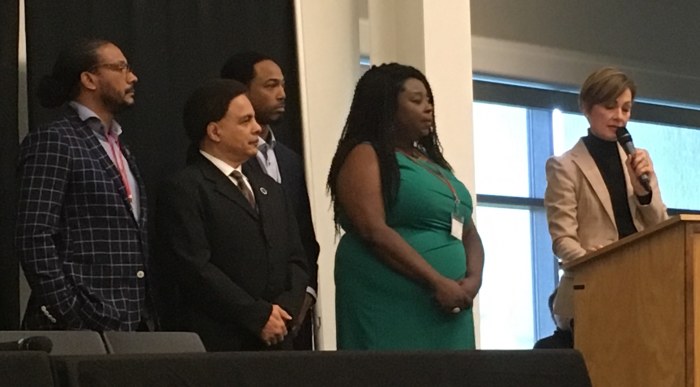Fourteen people representing a “diverse group of stakeholders” will recommend policies to reduce recidivism and racial disparities in Iowa’s criminal justice system, Governor Kim Reynolds announced on November 4.
Lieutenant Governor Adam Gregg, a former state public defender, will chair the Governor’s FOCUS Committee on Criminal Justice Reform, which will meet for the first time on November 7. FOCUS stands for “Fueling Ongoing Collaboration and Uncovering Solutions.” The other members are:
A “TWO-PRONGED CHARGE”
Iowa is notorious for having some of the country’s worst racial disparities in many areas of life. Reynolds announced last month that she would form a committee to “take criminal justice reform to the next level.” Speaking at the 7th Annual Iowa Summit on Justice & Disparities, which the NAACP held on October 15, the governor said,
The new committee will have a two-pronged charge. First, by December of this year, it will make recommendations to me, aimed at finding ways to reduce recidivism through successful offender re-entry. This will focus the foundation of a package of legislative proposals aimed at advancing our second-chance initiative this year.
Second, over the next year, the committee will take up the very complex issue of bias-free criminal justice in Iowa, looking at the full range of issues, including policing, prosecution, the judiciary, and corrections practices.
Reynolds is passionate about criminal justice reform because those changes can be a legacy for future generations. There are too many stories about “lives our system failed”:
innocent people victimized by someone struggling with substance abuse or mental health issues; young people who made a few wrong choices early in life, with tragic results; people who served their sentence, but then were met by a system and society that made it virtually impossible to find a pathway to success afterwards.
A “fairer, less biased, more opportunity-focused system” is also “critically important” for public safety and protecting communities, Reynolds said. Helping “ex-offenders avoid becoming re-offenders” is “the best thing we can do for victims of crime,” she added. Another collateral benefit:
At a time when we have a shortage of skilled workforce in all corners of Iowa, this is an amazing opportunity for us to enable ex-offenders to get their lives back on track and address our workforce needs at the same time. And we do that by tearing down those barriers that make it more difficult for them to re-enter society.
SMALL STEPS ALREADY TAKEN TO REDUCE BARRIERS
Reynolds recalled a law she signed this year, which protects employers from lawsuits if they hire people with criminal convictions. The Iowa House and Senate approved that bill unanimously. The Department of Corrections and Iowa Workforce Development have scheduled their first “employer and re-entry breakfast round table” for November 6 at the women’s correctional facility in Mitchellville.
Another law enacted this year, which also passed the legislature unanimously, limits the types of crimes that are grounds for denial, revocation or suspension of a plumbing or electrical license. “That might sound like a relatively minor issue, but honestly, it has proven to be a huge barrier for those that it directly impacts,” Reynolds told the audience.
NAACP leaders hailed the new criminal justice reform initiative. Speaking to reporters shortly after the governor’s remarks, Iowa-Nebraska NAACP Conference President Andrews said her organization had input on who would serve on the FOCUS committee.
To reduce barriers to employment, the NAACP supports “ban the box” legislation, which would prohibit employers from asking job applicants about their criminal records. Democratic and Republican lawmakers co-sponsored bills in the Iowa House and Senate this year that would limit public employers from asking about a job-seeker’s criminal history before the interview stage. Despite support from a wide variety of associations and advocacy groups, neither bill cleared a legislative committee. Reynolds has not endorsed “ban the box” initiatives. Business interests would likely lobby strenuously against any such restrictions on private employers.
Shelton McElroy, who delivered the lunchtime keynote at the NAACP’s justice summit, has personal experience establishing a career after serving time. Most of his speech focused on his life story and his work as national director of strategic partnerships for The Bail Project. But as he touched on the governor’s big news, McElroy raised one constructive criticism. He cautioned against using the label “offenders” or “ex-offenders” to refer to people with criminal convictions. “It’s a great concern that if we continue to see people as deficits, we can never see them as assets,” he said.
In recent years, I’ve become more aware that such labels are stigmatizing. So going forward, when reporting on voting rights for people with felony convictions, Bleeding Heartland will strive to avoid using “felons” as shorthand for those affected by Iowa’s current draconian policy.
Top photo: Governor Kim Reynolds (right) announces the creation of a committee to work on criminal justice reform at the 7th Annual Iowa Summit on Justice & Disparities in Ankeny on October 15. Looking on, from left: Shelton McElroy (national director of strategic partnerships for The Bail Project), Dedric Doolin (Cedar Rapids NAACP Branch president and secretary for the Iowa Nebraska State Conference of the NAACP), Kameron Middlebrooks (NAACP Des Moines Branch president), and Betty Andrews (president of the Iowa Nebraska State Conference of the NAACP).

